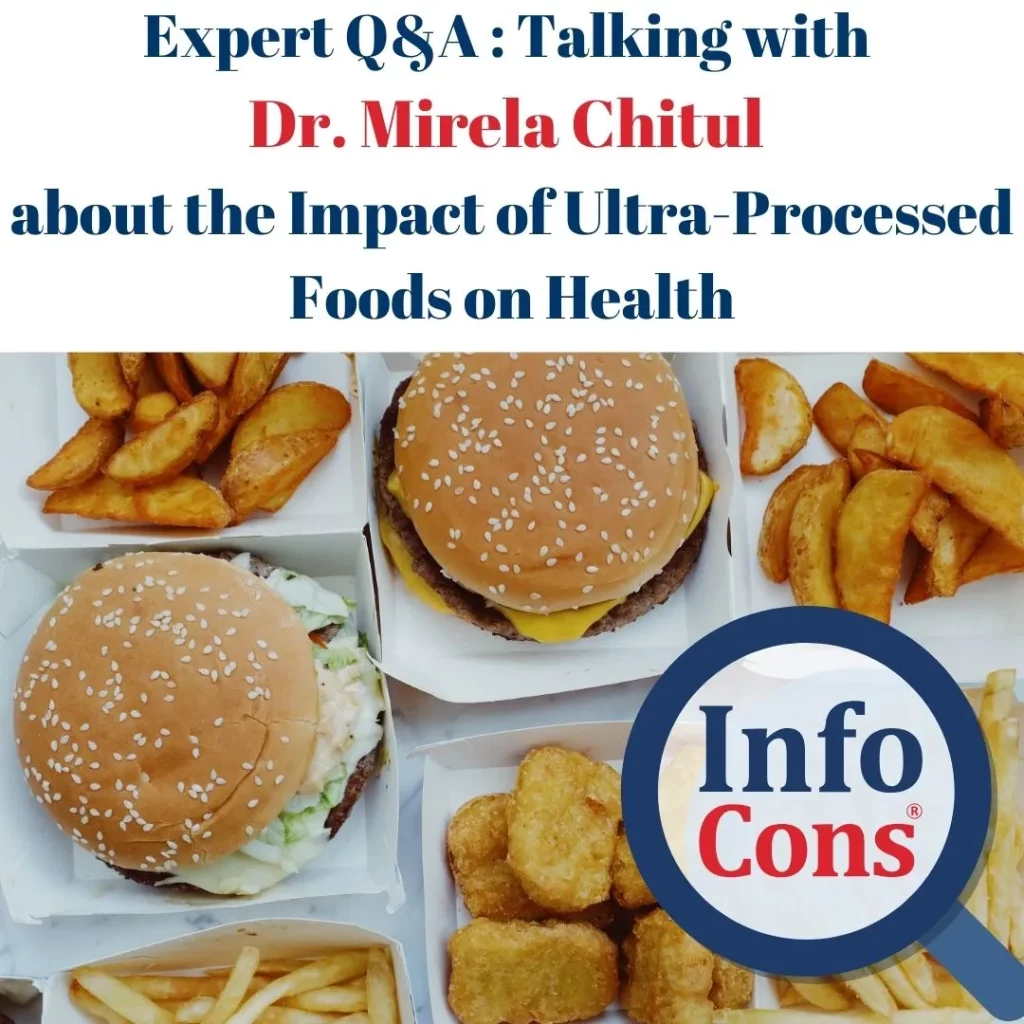
Ultra-processed foods have become a significant part of the modern diet. These foods, characterized by long shelf life, attractive packaging, and low cost, are produced through various industrial processes. Although they are accessible and extremely tasty, experts in the field warn us that their consumption is often linked to numerous health problems.
Designed for quick preparation or consumption, ultra-processed foods are often marketed as time-saving foods, as they include ready-to-eat meals, snacks, and drinks that require minimal cooking time or are already cooked. These foods contain numerous additives to enhance flavor, texture, color, and shelf life. Commonly used additives include emulsifiers, preservatives, stabilizers, and anti-caking agents.
We invited Dr. Mirela Chitul, Gastroenterology Resident at IC Fundeni, PhD candidate at UMF Carol Davila, to discuss ultra-processed foods, a topic that raises many questions and for which we want to gather answers from accredited professionals in various branches of medicine.
Read also : The 2024 Cybersecurity Resilience & Market Conference – InfoCons informs you !

1. “Ultra-processed” can mean many different things, including canned vegetables or various frozen products . Does “ultra-processed” automatically mean “bad for my health” ?
Dr. Mirela Chitul – “Not all ultra-processed products are dangerous. Although the term “ultra-processed” refers to foods that have been industrially transformed and often contain added ingredients, some of them, such as frozen vegetables, can be healthy options as long as they are not loaded with preservatives or artificial flavors. It is essential to distinguish between types of ultra-processed foods and focus on specific ingredients.”
Do You Know What Food Additives are ? InfoCons Consumers Protection Informs You !
2. What are the health risks for people who consume ultra-processedfoods ?
Dr. Mirela Chitul – “Frequent consumption of ultra-processed foods can lead to various health problems, including imbalances in gut flora, digestive issues, and increased risks of inflammatory diseases. These foods are often rich in additives that can interfere with metabolism and worsen existing chronic conditions, such as irritable bowel syndrome or gastritis.”
3. What do you consider the biggest traps on the label of an ultra-processed product ? Here we can think of terms like “clean label” or “no added sugar.”
Dr. Mirela Chitul – “Labels can often be misleading by using terms like “natural” or “no added sugar,” which do not always reflect the truth. For example, “no added sugar” can hide the presence of other sugar sources or sweeteners, and “natural” does not guarantee the absence of chemicals. It’s important to examine the ingredient list and be wary of ambiguous terms.”
4. Should the legislation be improved to better inform consumers about ultra-processedfoods ? If yes, how ?
Dr. Mirela Chitul – “Legislation should be more transparent and provide clear information about the ingredients in ultra-processed foods. Regulations could include strict requirements for labels to disclose detailed content of additives and exact amounts of sugar and salt. There should also be uniform standards for terms used on labels to prevent consumer confusion.”
Read also : What is the European Health Insurance Card and When Can It Be Used?
5. Are ultra-processed foods high in salt and sugar appealing to the brain ? Can we talk about addiction ?
Dr. Mirela Chitul – “Yes, ultra-processed foods that are high in salt and sugar can activate brain centers associated with pleasure and reward, inducing a continuous desire for these foods. These effects can be comparable to those of addictions, as repeated consumption can create a cycle of craving and excessive consumption, though this phenomenon is not an addiction in the strict sense of the word.”
6. Given that they are always at hand, tasty, and cheap, is it easier to overconsume ultra-processed foods without realizing it ? What does excess mean ?
Dr. Mirela Chitul – “Yes, ultra-processed foods are often available in large quantities and are easy to consume, which facilitates excessive consumption. Excess refers to consuming more than the body’s caloric and nutritional needs, which can lead to weight gain and nutritional imbalances. Frequent consumption can have negative effects on metabolism and overall health.”
7. What is the impact on children‘s health if ultra-processed foods are part of their diet from a young age ?
Dr. Mirela Chitul – “The early introduction of ultra-processed foods into children’s diets can negatively affect their overall development and lead to growth and developmental problems. Constant consumption of such foods can negatively impact children’s gut health, contribute to obesity, and establish unhealthy eating habits that can persist into adulthood.”
Read also : How to Properly Store Fresh Eggs: Tips and Tricks for Food Safety
8. What is the impact of ultra-processed foods consumption on the health and quality of life of the elderly ?
Dr. Mirela Chitul – “For the elderly, excessive consumption of ultra-processed foods can lead to deteriorating digestive function and contribute to the onset of chronic health problems. These foods can negatively influence the absorption of essential nutrients and worsen existing conditions, affecting quality of life and increasing health risks.”
9. How does the long-term consumption of ultra-processed foods containing high amounts of salt, added sugars, and saturated fats impact health ?
Dr. Mirela Chitul – “In the long term, consumption of ultra-processed foods rich in salt, sugars, and saturated fats can lead to serious metabolic problems, such as hypertension and diabetes. These foods can also contribute to the development of chronic inflammation and negatively impact cardiovascular health, significantly reducing quality of life.”
10. Which categories of ultra-processed foods have the most significant health impact?
Dr. Mirela Chitul – “The ultra-processed foods with the greatest impact are those rich in added sugars, trans fats, and additives. Examples include sugary drinks, chips, and industrial bakery products. These products can have significant negative effects on health, contributing to problems like obesity and metabolic dysfunctions.”
Read also : Expert Q&A : Talking with PhD Associate Professor Florin Grama about the Impact of Ultra-Processed Foods on Health
11. How can we change unhealthy eating habits to incorporate more beneficial foods for health and quality of life?
Dr. Mirela Chitul – “Changing eating habits involves shifting from ultra-processed foods to whole, natural foods. It helps to plan balanced meals that include vegetables, fruits, and quality proteins, gradually reduce processed foods, and make conscious nutritional choices. Additionally, continuous education about the benefits of whole foods can support these changes.”
The European InfoCons App can help you monitor the amount of processed foods in your diet.
Read the label carefully: this helps you identify and avoid foods with excessive additives , salt, sugar, or saturated fats. Choose products with minimal ingredients.
The European InfoCons App provides you with the number of additives , ingredients, and quantities of salt and sugar , directly on your mobile phone . This information is essential for consumers , helping them make informed choices regarding products .
Article written by Cosmina Nițu
Master’s degree in nutrition and diversification consultant
Translated from Romanian by Andra Nițu
Master’s degree in communication sciences
InfoCons – European Organization for Consumer Protection and Promotion of Programs and Strategies , a full member of the World Organization Consumers International, founding member of the Federation of Consumer Associations, and member of ANEC .